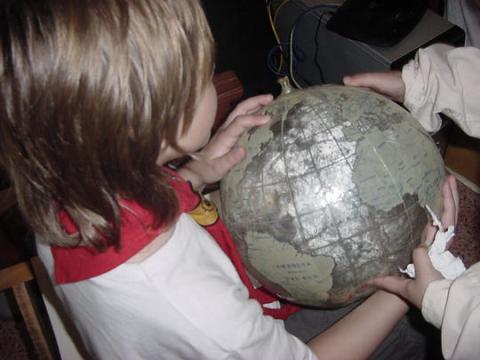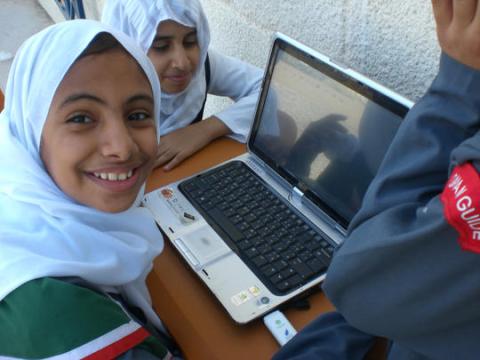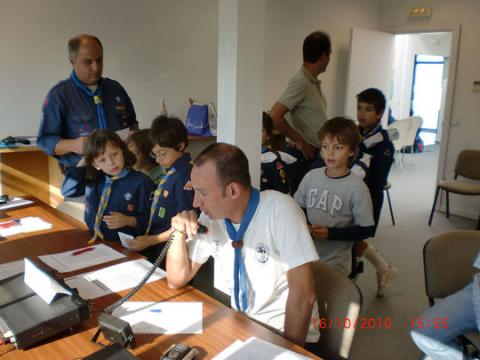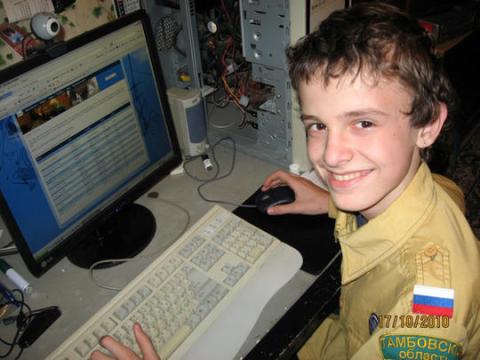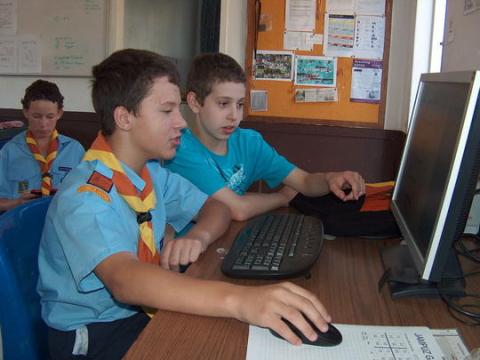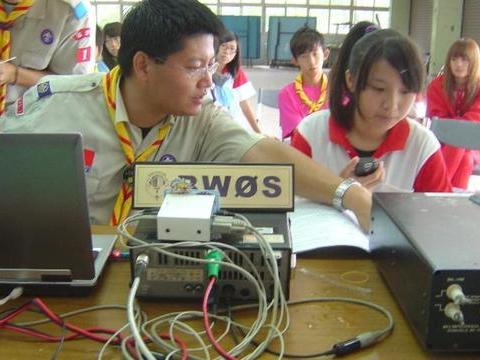JOTA-JOTI 2010 - Right to be Heard
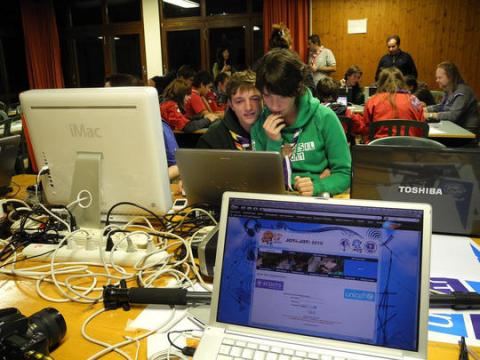
October 16-17, Scouts from all corners of the world joined together to participate in the annual JOTA-JOTI (Jamboree On The Air-Jamboree On The Internet). This was the 53rd iteration of the JOTA and the 14th for the JOTI. As a Scout event this is one that brings together the largest number of Scouts together for a single event, participation has well over 500’000 participants over the 48 hours that the event is happening.
Activities ranged from thematic discussions to, a contest by UNICEF challenging the participating youth to write a story and become spokespersons for their communities. Using and taking advantage of the new social media that has become available recently participants sent in their contributions and messages via Facebook, Twitter, Youtube and Flickr as well asUNICEF’s Voices of Youth blog.
More than 12.000 JOTA-JOTI stations registred on jotajoti.org
View on Google Map - Download for Google Earth - View Stations Weblogs
Scouts from around the world participated by joining in via radio (JOTA) or by a dedicated internet chat channel (JOTI), where there were engaged in discussions about, Youth Rights, Youth Involvement and Youth Empowerment which were the main sub themes of JOTA-JOTI 2010. You can find some of the responses organized by sub-themes below.
The World Scout Bureau had their base up and running at “les Pérouses” Scout Centre in Satigny, Geneva. Some Scouts from Scouts et Guides de France (SGDF) and The Catholic Scout Association of Portugal (CNE) were also present in Satigny. They communicated with Scouts from around the world taking advantage of the broadcasting station setup by the JOTA team as well as the media setup by the JOTI team to chat on the internet with their fellow Scouts on the theme and discussion points at hand. A special guest, from UNICEF, Mr Andres Guerrero, Director for Partnerships also visited the event and engaged the youth in discussions on the rights of the child.
Browse Participants' Responses
Sub-theme n ° 1 / Youth Rights
Question n° 1: Do you know your rights? Can you name five rights that are part of the Convention on the Rights of the Child?
Respect for the views of the child, Freedom of expression, Freedom of association, Right to privacy, Access to information. (Malaysia)
We know some of our rights, but not well enough. We hope that the theme of the Jamboree on the Internet and Air this year will give stimulus to a more detailed study. Five rights that we know of: - The right to life, - The right to preserve their identity, - The right to family - The right to freedom of expression, - The right to education. (Russian Federation)
I know there are 5 rights of the children. First, young people have the right to enjoy leisure. Second, young people have the right that their private sphere of life is not infringed. Third, Youth have the right to choose and the right to work. Fourth, adolescents have the right to freedom of their thoughts and feelings of. Last, Youth have the right not to be discriminated against because of national origin, sex, religion, education, age, and differences in physical and mental disabilities. (Korea)
Question n° 2: Which right, according to you, is the most important? And why?
Education because I acquire more knowledge. (Uganda)
The most important is respect for others, because one must be respectful to others if he wants to be respected. (Costa Rica)
I think the most important is the right to life. Because God gave us life and no one has the right to take it away. (Costa Rica)
The right to education, because education is the key to everything in this generation. Everybody has to be educated to have a good future (Uganda)
To have a family and to be part of society (Paraguay)
The right to clean water and access to medicine, (Finland)
Freedom of will (Finland)
We believe that the most important right for the children is to live in a family. Because parents give us life, take care of us and are engaged in our education! (Russian Federation)
The right to enjoy leisure is the most important for young people. Students have to study all the time at school and home. Youth want to spend their adolescence doing what they want to. Youth need to enjoy their life. (Republic of Korea)
The most important is the Freedom of Expression. Because, it's time! Tomorrow’s leaders are today's youth. That’s why we need today’s leaders to always support us and not condemn us when we voice out our opinions! Who knows? It might be useful, if not today, maybe for the future (Malaysia)
Live in peace (Lebanon)
Question n° 3: Describe a situation where you or someone you know, had the feeling that your/their rights were not respected.
When I attended the sixth grade my dad told me he wanted to take me out of school and I asked why? I had good grades and I was a child of honor and he said that was not related to what I’ve done. I promised that I would learn more in school and study. I also told him that I have the right to education, but he said it was better for me to leave school. Later, he asked me to forgive him for not respecting my right to education. I forgave him and told him that nobody is perfect except God. I then gave him a hug and said thank you. (Costa Rica)
When you are punishing a child without explaining to him why (Paraguay)
Well, it's frustrating when people, easily ignore me, just because they think that I'm a raw-minded youth. (Malaysia)
Every time our voice is not heard properly at our local as well as national levels. (Pakistan)
We know a girl named Brenda, who did not have a home or family, and we try to help her. But it went a long cold and she had to sleep on a card, that's why she died of hunger in the street. (Costa Rica)
I had a friend at school that I liked so much. She would tell me her problems and I also told her mine. One day her father came back and stopped her from going to school. (Uganda)
School students wanted to abolish 'hair regulation'. But, the school ignored their opinion and they reinforced the rule. (Republic of Korea)
I was offended a lot when I was young by the lack of opportunities for me and my fellow students to express our thoughts and opinions. Some teachers were deliberately undermining those views making us feel really oppressed (Oman)
There are children in Trinidad that are abandoned by their parents. (Trinidad and Tobago)
I attended an event where adults made all decisions. This act discriminated the young and totally discouraged the participation of the young in decision making. Do they think we are not mature enough to take good decisions? (Brunei Darussalam)
Which were the answers from others participants that really captured your attention, and why?
Chatting about traditional favorite food, they answered that theirs was dog meat (Uganda)
What is a country with peace? (Costa Rica)
What impressed me most was of a Cuban who told me "If we can choose our Presidents" (Costa Rica)
I did the JOTI. I met someone in the channel. I asked age, sex, location. The answer was 22, male, Angola. The words '22' and 'Angola' captured my attention, because that was the first time I was chatting with an Angolan who is studying in university. (Republic of Korea)
Sub-theme n ° 2 / Youth Involvement
Question n ° 1: If you were meeting with your country's president today, what would you like to tell him about youth involvement?
That there is not enough for the Youth to do! Today, the Youth who have the power to help others around the world lie around on their cell phones, computers or play station games, instead of becoming active in their communities! Today, in my country, there is very little opportunity for the youth to become involved. We have some Organizations, but they are regarded as "FOR LOSERS ONLY" by most of my peers. Our community centers have been vandalized and are not safe or even functioning. Why is this? Because the Youth of today are not AWARE! (South Africa)
Young people have different opinions which are important for society and its plan of Government, that the youth have no word in Congress and it also is part of the country which governs them such that the people in government should take into account some of them because they know very well what they have in life. (Colombia)
To always involve the youth at every stage of planning. (Uganda)
That scouting is the best way for youth to be involved (Brazil)
That young people are entitled to participate in the taking of decisions to improve the country (Honduras)
The wealth of a country is its youth. It is indeed so rich that any country should support its development. Away from paternalism, our rulers and authorities will enable young people to reach the level that is theirs to beat the future of their homeland. (Germany).
I would tell him that today's youth needs to have more community involvement whether its Scouts or something else. It gives a good strong basis for strengthening their bonds with kids their own age as well as learning skills that they can use later in life. (Canada)
We would like to speak with Dimitry Medvedev about support Scouting in Russia, because this movement is designed for children aged from 8 to 16 years old, and this age range is not very much involved at this time. (Russian Federation)
Increased interest in the ethical problem of youth (Italy)
If I were to meet the president today, I would tell him that the youth need to push his agenda of abolishing the empowerment Youth Council (Sangguniang Kabataan) and instead to use this government agency to help the youth help themselves. (Philippines)
Question n ° 2: According to you, how can young people become more involved in decision-making within their communities?
Creating a youth committee so that every decision should also be passed by that Committee. It would have the role to consult with young people in their community. (Colombia)
Serving their communities, helping and discovering their problems. (Brazil)
Within the voluntary sector, civil society, young people can engage effectively in the life of their country. The authorities should stay tuned to this segment of society, which will allow involvement of young people in various civic tasks. (Germany)
By joining organizations such as Scouts, small community groups, charity organisations. Adults need to provide us with facilities where we can form our own groups within the community, give us the opportunities to be educated on matters of the environment or other matters which we are really passionate about as well as provide us with a platform where we can voice these opinions. (South Africa)
By talking to either members of parliament and discussing their views/thoughts or by interacting with local organisations and helping them to strive and excel in the community's aspirations in the future.
Question n ° 3: Imagine something you could do this month to participate in creating a better world and describes it in a few lines
Participating in tree planting where I would teach the young people on how to set up a nursery bed and the importance of tree planting. I would also help people in Busoga region in Eastern Uganda on how to eradicate jiggers that have greatly affected many of them. (Uganda)
Helping my neighborhood to be more aware of the waste they throw away everyday. Carry out campaigns in supermarkets for people not to accept plastic bags. (Brazil)
Organize clean-up campaigns in my community with all neighbors (Honduras)
Organize a debate in my school on topics of interest, with various subjects political, social, religious or cultural.
This month I could get my Scout Troop to participate in the clean up of the field opposite my house, recycling the rubbish. I could do a presentation to my school on the violation of child rights and how we can stand up to make a difference. (South Africa)
Give some time to educate young people (Italy)
First, encourage the youth to participate in the Scout movement. Second, organize and conduct activities like charity programs, environment campaign, seminar about their rights and obligations, and lastly, emboss to them to live the ideals and principles of a good citizen. (Philippines)
Which were the answers from others participants that really captured your attention, and why?
How do you proceed in your country with people who need help? Because in my country, we do not do many things for people with limited resources, and we do not have them in mind.
How do you live your Scout life in your city? There are very few scouts in my town. (Colombia)
Helping street children and the aged people (Uganda)
Asking me if somebody was there above 18. I never knew what they wanted to chat about. (Uganda)
Asking the way we are working in our groups to take samples and applying them in their countries (Honduras)
A Boy Scout from Afghanistan told me that most of the Youth in his area have no school to go to and are all very scared from the war. Another Scout in Pakistan pointed out that the education facilities were of extremely poor standard, but that the few facilities that are available are highly appreciated as education in Pakistan is difficult to "get hold of". (South Africa)
That the reasons why the Youth of today are so un-involved with the outer world is simply because they are not aware of what is going on around them. They are caught up in personal life of their own personal things and are not concerned about the suffering of others, simply because they do not know how and where they can help. This helped me with my own thoughts as to how we can get the Youth more involved. (South Africa)
Sub-theme n° 3 / Youth Empowerment
Question n° 1: If you could change one thing in the world today, what would it be?
I would give free health care to all. I think this one component would change the world for the better. If people had free health care their health would improve, less people would suffer from premature deaths and people's overall life quality will improve. (Philippines)
I would eradicate poverty, and find a cure to AIDS. (Uganda)
We would ban and destroy all weapons of mass destruction (nuclear, chemical, biological), because even a small problem at any stage of manufacture or storage can lead to a horrible catastrophe on Earth. (Russian Federation)
Have more money to stop world hunger (Italy)
I want to make this world greener, such as an uninhabited forest, beautiful and fresh. (Indonesia)
I would banish greed as an emotion from this world, for I believe that it is greed that lies at the core of the problems around the world today. Poverty, War, Climate Change etc.. Imagine a World Without Greed. It would be a shared compassion amongst mankind to help those in need. "This world has enough to sustain every mans need... But not every mans Greed." Mahatma Gandhi (South Africa)
Make the world more tolerant. Make everyone understand, how other people feel and that people really are not that different. Scouting shows the world that it is possible to be together and do the same thing. (Estonia)
I would change everyone to be a very useful person! (Thailand)
Change people's hearts so that they do not feel that they must force their will on others.
Ban once and for all arms sales. This would reduce wars, and the money will finally be used for the development of the poor countries rather than their destruction (Switzerland)
Question n° 2: How do you imagine your life in 5 years time?
I imagine my self as a good leader. I'll be doing my best to set a good example to my subordinates, sharing my knowledge and skills. (Philippines)
I will be a super politician since I am already mature. (Uganda)
Use new technologies that do not harm the environment, improving living standards for all the world's population, eliminate hunger in the world, further integration of young people from different countries to create a better world. (Russian Federation)
Finish high school. (Portugal/Italy)
Busy. Dirty (polluted). Fragile. I imagine a world not that much different from today. I hope to see an improvement as the MDG campaign/goals come to an end in 2015, and the nearer the date, the more people become involved. More species will be extinct, and we will continue making discoveries in better, safer, more sustainable forms of electricity. (South Africa)
Be able to live in a world with peace and a green environment for my family and me. (Philippines)
With much pollution (Mexico)
I will try to realize the life of harmony and balance with nature. and I would support the Indonesian government's program with the movement of one man, one tree. so that in the next 5 years forests forests could be green again because forests are the lungs of the world
Question n° 3: Describe a situation where you or your group has been placed in a situation of empowerment.
When our scout troop and outfit have meetings and activities where we share and learn different ideas. (Philippines)
Make dinner for the entire family. (Portugal)
I have been in a situation like this with my Public Speaking events, and also when I attended the Johannesburg Zoo to do my 67 minutes for Mandela day. I was instructed what to do, given the tools for doing it, and had to lead others in the activity. (South Africa)
When we had blind scouts in a national camp for the first time. People were wowed, by what they could do, how much they could participate in, and they learned to interact with sighted people. (Estonia)
Which were the answers from others participants that really captured your attention, and why?
"When people see the way we are living on T.V they say oh that’s terrible, but then they go off to eat their dinners." (Philippines)
“Heal the world.” I like it because it's good. (Uganda)
The most interesting responses of other participants about life after 5 years because each country has its traditions and its vision of development, so the answers were very different, but the belief that our world will be better after 5 years was unanimous! (Russian Federation)
A 13-year-old child with ease to communicate with me, I was thinking he was an intelligent teenager, was only a child. It is amazing to me. (Indonesia)
"Everyone should have equal rights in suggestions and others". I got this answer from the scout of Brunei. The reason it captures my attention is because in the modern day today there are still some countries that do not observe equal rights. (Philippines)
